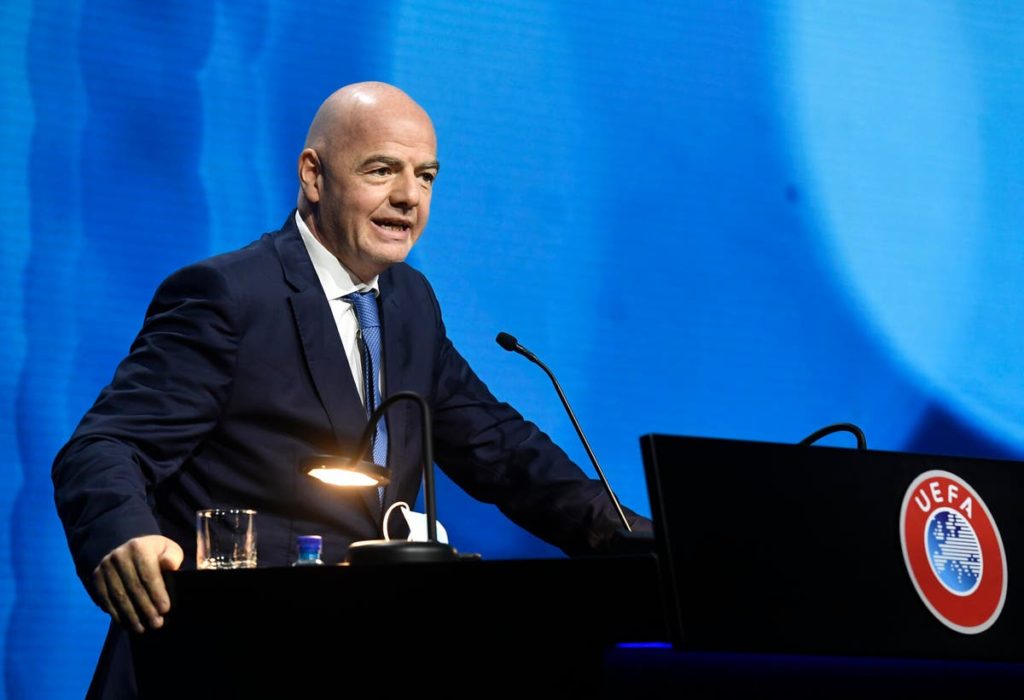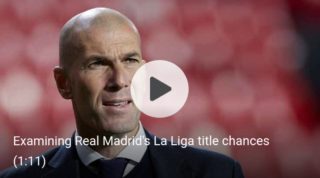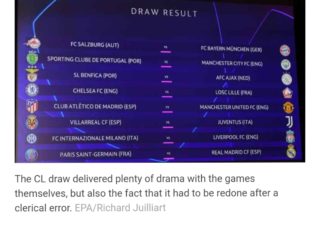Either you are in, or you are out.
The president of world soccer’s governing body, FIFA, delivered a short but powerful message on Tuesday to the dozen rich and powerful European clubs whose planned breakaway Super League has threatened to upend the decades-old structures that underpin the world’s most powerful sport.
“If some elect to go their own way then they must live with the consequences of their choice, they are responsible for their choice,” the FIFA president, Gianni Infantino, said in an address to European soccer leaders at their congress in Montreux, Switzerland. “Concretely this means, either you are in, or you are out. You cannot be half in and half out. This has to be absolutely clear.”
Infantino’s intervention came amid mounting fury against a proposed European Super League that has turned the sports project into a national emergency in the three countries — England, Spain and Italy — that are home to its 12 founding members.
In Britain, which is providing half of the breakaway group’s members, Prime Minister Boris Johnson met Tuesday with fan representatives and leaders of the Premier League. Later, his office pledged to do whatever it took to stop the multibillion-dollar competition from proceeding, vowing that nothing was off the table.
“We are exploring a range of options, including legislative ones,” said Max Blain, Johnson’s spokesman.
The comments came as the French champion, Paris St.-Germain, joined the growing list of elite clubs who have said they will not take part in the new league.
Instead, Nasser al-Khelaifi, the P.S.G. chairman, pledged his support to UEFA and its existing Champions League, the event that has been European soccer’s elite competition for more than half a century.
“We believe that any proposal without the support of UEFA — an organization that has been working to progress the interests of European football for nearly 70 years — does not resolve the issues currently facing the football community, but is instead driven by self-interest,” he said.
Al-Khelaifi’s disavowal came after similar ones on Monday by the leaders of Bayern Munich and Borussia Dortmund, two German powerhouses who had been seen as candidates to complete the Super League’s permanent membership of 15 teams. The Dutch club Ajax Amsterdam, a four-time European champion, also said it would not take part.
The backlash to the proposal has been withering and widespread, with advocates for the tournament increasingly hard to find. Even figures associated with the teams that have signed up to the project — which is being backed by the American investment bank JPMorgan Chase — have expressed their disappointment.
“It is not a sport when the relationship between the effort and the success, the effort and the reward doesn’t exist,” said Pep Guardiola, the decorated coach of Manchester City, one of the Super League’s founding members. “It is not a sport if success is already guaranteed. It is not a sport if it doesn’t matter if you lose.”
Jürgen Klopp, the German coach of the English champion Liverpool and a longtime opponent of the type of closed competition his club has agreed to support, said he would be speaking with the team’s American owners about the plan. By Tuesday morning, Klopp, who is hugely popular in England after leading Liverpool to domestic and European titles in the last two years, became the favorite among oddsmakers to be the next coach to leave a Premier League club.
Privately some of the clubs involved in the project have expressed frustration about how it has been presented. A statement to announce a league that its backers said would “open a new chapter for European football” came late on Sunday as much of Europe slept.
But after the teams involved made almost no public comments, the Real Madrid president Florentino Pérez, the only executive involved in the scheme to defend it publicly, was left to defend it alone on a chat show that was broadcast at midnight Monday in Spain.
Pérez, the chairman of the new league and one of its leading proponents behind the scenes, insisted the project would benefit all of soccer, which he said was at risk of economic collapse because of the global pandemic. He did not address why so many of the clubs that have signed up to the new league had been so badly mismanaged before the pandemic struck, or make a persuasive case for how funneling billions of dollars in television and sponsorship revenue to a handful of top clubs would filter down to the leagues and teams that will be left out.
Many of those teams fear an immediate loss of value for their own teams and leagues, and possibly financial ruin. Fans, meanwhile, have railed against what they see as a cash grab by a few rich clubs that threatens to destroy century-old rivalries and beloved domestic leagues.
“Whenever there is a change, there are always people who oppose it,” Pérez said on the Spanish soccer show “El Chiringuito de Jugones.” “We are doing this to save football at this critical moment.”
Pérez also contended that the competition would serve the wider soccer economy by spending money on talent, essentially arguing that those excluded would act as feeder teams for the far richer Super League clubs. An additional annual “solidarity” payment of 400 million euros — almost $500 million — would also be provided to the have-nots, he said. That amount would offset some of the billions lost through the devaluation of domestic and international television rights that other competitions would suffer as a result of the new tournament, though most experts argue the financial costs could be far higher for those on the outside.
Despite the backlash, however, the Super League’s backers are forging ahead. Their lawyers already have filed motions in courts across Europe to ensure their efforts cannot be stymied. But the secrecy with which they have worked has infuriated their putative partners in the game.
England’s Premier League held a meeting on Tuesday without the six Super League teams, and finished it by threatening to sanction the rebels.
“The 14 clubs at the meeting unanimously and vigorously rejected the plans for the competition,” the league said in a statement. “The Premier League is considering all actions available to prevent it from progressing, as well as holding those shareholders involved to account under its rules.”
In Italy, matters became even more fractious. On a conference call late Monday, team owners and executives turned on officials from Italy’s three Super League members — A.C. Milan, Inter Milan and Juventus.
The Torino president Urbano Cairo branded Agenlli a “Judas” for what many perceived as his disingenuous behavior in negotiations with UEFA about revisions to the Champions League. Agnelli is said to have used an expletive to say he did not care if Juventus remained in Serie A, according to a person present in the meeting.
“It’s a betrayal,” Cairo said. “It’s what a Judas does.”
FEATURED IMAGE: FIFA’s president, Gianni Infantino, addressed the UEFA congress on Tuesday. Richard Juilliart/UEFA, via Associated Press
By Tariq Panja/The New York Times





